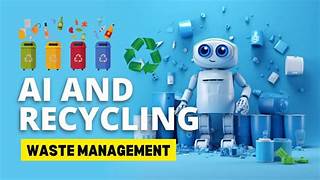Developing AI Algorithms for Effective Waste Management and Recycling
Introduction
With global waste production increasing at an alarming rate, effective waste management and recycling have become critical to environmental sustainability. Artificial Intelligence (AI) is revolutionizing this sector by optimizing waste sorting, enhancing recycling efficiency, and reducing landfill dependency. This article explores how AI-driven algorithms are transforming waste management, their key applications, challenges, and future prospects.
The Role of AI in Waste Management
AI leverages machine learning, computer vision, and robotics to improve waste collection, classification, and recycling. Key areas where AI is making a difference include:
- Automated Waste Sorting: AI-powered systems categorize waste efficiently, reducing contamination in recycling streams.
- Predictive Waste Collection: AI analyzes waste generation patterns to optimize collection schedules and reduce operational costs.
- Enhanced Recycling Processes: AI improves the efficiency of recycling facilities by identifying and sorting recyclable materials with precision.
- Waste Reduction Strategies: AI provides insights into consumption patterns, helping businesses and individuals minimize waste production.
AI Technologies in Waste Management
Several AI technologies are being employed to tackle waste management challenges effectively:
1. Machine Learning (ML) Algorithms
ML algorithms analyze large datasets to predict waste generation trends, optimize collection routes, and improve recycling techniques. These models adapt to evolving waste patterns, enhancing efficiency over time.
2. Computer Vision and Image Recognition
AI-powered image recognition systems use sensors and cameras to identify different waste materials. This technology enables:
- Automated sorting in recycling plants.
- Detection of non-recyclable contaminants.
- Recognition of reusable materials for circular economy initiatives.
3. Robotics and Automation
AI-driven robots enhance sorting accuracy and speed in recycling facilities by using robotic arms equipped with vision systems. These robots:
- Differentiate between plastic, metal, paper, and organic waste.
- Separate hazardous waste to prevent environmental damage.
- Reduce human exposure to toxic materials in waste processing plants.
4. Internet of Things (IoT) and Smart Sensors
IoT sensors integrated with AI algorithms monitor waste levels in bins and dumpsters, enabling:
- Smart waste collection scheduling to avoid overflows.
- Real-time tracking of waste composition.
- Efficient resource allocation for collection services.
5. Predictive Analytics for Waste Reduction
AI analyzes waste data from households, industries, and municipalities to predict future waste generation and suggest waste reduction strategies. These insights help policymakers and businesses implement more effective waste management policies.
Benefits of AI in Waste Management and Recycling
1. Increased Efficiency and Accuracy
AI-driven waste sorting systems improve the accuracy of recycling by identifying and separating materials more effectively than traditional methods.
2. Cost Savings
Optimized waste collection routes and reduced contamination in recycling streams lower operational costs for waste management companies and municipalities.
3. Environmental Sustainability
By reducing landfill waste and promoting recycling, AI contributes to lower carbon emissions and a cleaner environment.
4. Improved Public Awareness
AI-powered mobile apps educate users about proper waste disposal and recycling practices, encouraging responsible waste management behaviors.
Challenges in AI-Based Waste Management
1. High Implementation Costs
Developing and deploying AI-driven waste management solutions require significant investment in infrastructure and technology.
2. Data Limitations
AI algorithms rely on high-quality data for accurate predictions, but inconsistent or incomplete waste management data can hinder performance.
3. Integration with Existing Systems
Many waste management companies use outdated infrastructure, making it challenging to integrate AI technologies seamlessly.
4. Ethical and Privacy Concerns
Using AI for waste tracking raises concerns about data privacy, particularly in monitoring individual consumption and disposal habits.
Future Prospects of AI in Waste Management
- AI-Powered Circular Economy: AI will enhance material recovery and reuse, supporting a sustainable circular economy.
- Blockchain for Waste Tracking: Blockchain integration can improve transparency and accountability in waste management.
- Advanced Robotics: Future AI-driven robots will achieve near-perfect waste sorting accuracy, reducing landfill dependency.
- AI in Biodegradable Waste Processing: AI will optimize organic waste composting and biofuel production processes.
Conclusion
AI is revolutionizing waste management and recycling by improving efficiency, reducing costs, and promoting sustainability. While challenges such as high costs and data limitations exist, continued advancements in AI and digital infrastructure will drive widespread adoption. By leveraging AI-powered solutions, businesses, municipalities, and individuals can work together to create a cleaner, more sustainable future.


